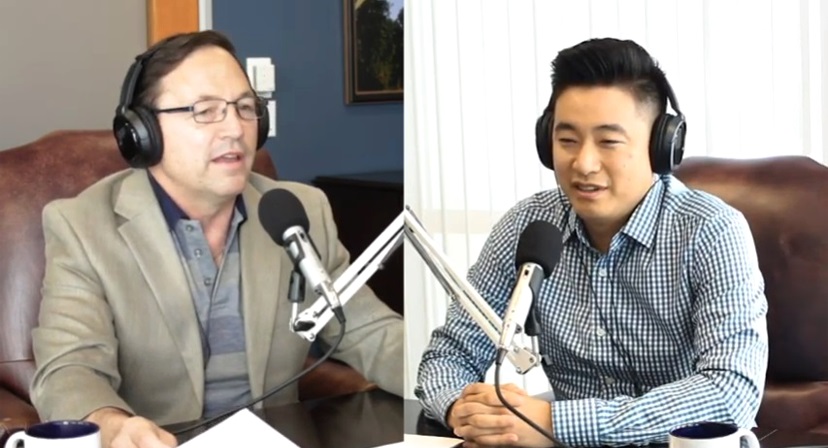
Pasadena family law attorney, Donald Schweitzer, and Anthony Lai, an associate attorney with Schweitzer’s law firm, talk about the reality of family court litigation and attempt to debunk several myths that have grown out of movies or TV shows showing court room scenes, in the latest episode of “Exhibit A.”
Schweitzer hosts a regular podcast, “Exhibit A,” where he invites experts in his law firm’s core practice areas – family law, estate planning, domestic violence, and trust and probate law – and discuss these topics based on their actual experiences in the court room or as they work with their clients.
In the latest “Exhibit A” episode, Schweitzer and Lai tell how people have different expectations when it comes to family court cases, and that people may experience culture shock when they are party to litigation for the first time.
The episode is titled “Reality vs. Hollywood.”
“The reality of family court is that it’s not as sexy, or exciting, as what you see on TV or in the movies,” Lai says. “They tend to trump up the drama up to Level 11 to make a good TV show, which is great. But, unfortunately, what that causes is a misconception of what family court is really like. It’s much more procedural. It’s much more structured, and the back-and-forth arguing, the yelling and screaming, a lot of that isn’t really happening in real life. It happens sometimes, but a good judge would not allow that to happen.”
The two attorneys also came up with a list of common myths or misconceptions that people usually have about family law and family court cases. One of these myths is that every family law case requires a court hearing — a belief that sometimes leads parties in a matter to be hesitant, to pursue their issues further.
“Well, the good news is that 80 to 90 percent of family law cases get resolved without you ever having to step foot into a courtroom,” Lai says. “The very small minority of the cases that do tend to be the ones that are a little bit higher conflict or ones that you’re not able to come to agreement on. But it is entirely possible to get your case resolved without ever having to go to court.” Schweitzer says that in his experience, he finds that the only time that family cases go to trial is “when the other side is being unreasonable.”
“So I think that’s the reason why most of us settle 95 percent of our cases right now,” Schweitzer says. “Some people may have to go to court initially, but they don’t necessarily have to go to trial. And trial actually doesn’t occur as often as people think. And that’s good.”
Another common misconception people have is that mothers always win in family court cases.
Lai says that mothers may have had an advantage at one point, at a time when women were not the ones out working and were mostly at home caring for their children, but that has changed.
“We’re now in 2019 and, and the job market has changed. Women are working and that notion of women or mothers being the only winners in family law court is no longer true,” Lai said. “There is no real specific gender bias as to who is successful in court. It really does matter who has the better case, who’s better prepared and who can prepare their arguments and the case.”
Schweitzer pitches in by saying there’s been a change in the way judges are handling family court cases. He said the code has always been gender-neutral, but that judges haven’t necessarily been always gender-neutral.
“There’s still bias among judges for a variety of reasons, whether they like tall people or short people,” Schweitzer says. “I mean that’s just human nature. So we have that. But in my profession or my practice, I’ve seen that men are getting more time with their children and more 50 percent orders or primary custody than ever before.”
The attorneys also discussed a common nightmare scenario of children being put on the stand during litigation, and being made to choose between their parents. It is a myth, and Lai says it’s something that would never happen.
“It’s absolutely traumatic for a minor child to have to be put in that situation. And our courts go to extremely long lengths to ensure that these children are protected from that type of situation,” Lai says. “So, no, a child will not be put on the stand to be made to choose between their parents. There are processes by which their testimony can get into court.”
Schweitzer and Lai also talked about how admissions of infidelity and evidence of divorce could impact custody proceedings, and provide their viewers with a realistic estimate of how long or how much time do family court cases take in litigation.
“When you see courtroom proceedings on TV or movies, you are looking at maybe a three- to four-hour court hearing with multiple witnesses and multiple rounds of cross examination,” Lai said. “The reality is these courts have about 20 cases on their calendar each day that they need to get to. So the average time you’re actually in front of the judge ranges anywhere between 15 and 20 minutes in real life.”
The most current as well as past episodes of “Exhibit A” are viewable from the law firm’s website, www.pasadenalawoffice.com.
The Law Offices of Donald P. Schweitzer are located at 201 South Lake Ave Suite. 800, in Pasadena. For more information, call (626) 683-8113.





